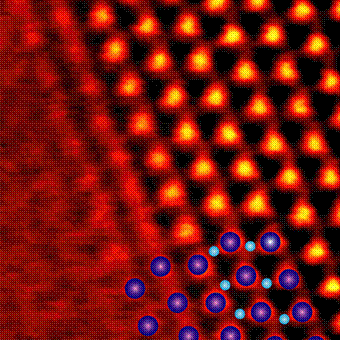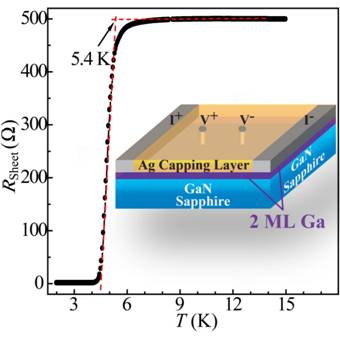Discovery of an Artificial Two Dimensional Superconductor with Graphene-like
Structure
Time:2015-03-13ClickTimes:
Recently, Prof. Jian Wang at Peking University, in collaboration with Prof.
Qi-Kun Xue, Prof. Xu-Cun Ma, Prof. Xin-Cheng Xie, Prof. Xi Chen, Prof. Lin Gu,
Prof. Hui Yang, Prof. Mingliang Tian, and Prof. Lian Li etc discovered a new 2D
superconductor with graphene or silicone-like structure formed by the substrate.
It is two-atom layer crystalline Ga grown on GaN(0001) by molecular beam epitaxy
(MBE). Both in situ scanning tunneling spectroscopy and ex situ electrical
magnetotransport and magnetization measurements show the superconductivity in
such two-atom layer crystalline Ga. The superconducting transition temperature
TC is 5.4 K, which is 5 times higher than TC in stable bulk Ga phase. The
graphene-like structure, which is totally different with Ga bulk structure,
might also induce some interesting properties in this two dimensional material.
Besides, GaN substrate is a wide used semiconductor in industry, our result
demonstrates a pathway for exploring atomic-scale 2D superconductors by surface
and interface engineering in a broad range of metal-semiconductor
heterostructures, which benefit from present semiconductor technology and
ultrathin film fabrication technique. The results were published in Physical
Review Letters (PRL 114, 107003(2015)) as an Editors’ Suggestion paper. Jian
Wang and Xu-Cun Ma are corresponding authors of this paper. Huimin Zhang, Yi Sun
and Wei Li contributed equally to this work.

| 
|
Figure 1. Transmission electron microscopy (TEM) image of the interface of
two-atom layer Ga on GaN substrate.
| Figure 2. Transport result showing an onset Tc of 5.4 K. The inset is a
schematic measurement structure.
|
The work was supported by National Basic Research Programs of China, National
Natural Science Foundation of China, 1000 Talents Program for Young Scientists
of China, the Research Fund for the Doctoral Program of Higher Education (RFDP)
of China, and Collaborative Innovation Center of Quantum Matter, China.
